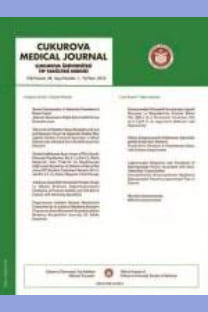COVID-19 nedenli sosyal izolasyonun yaşlılarda COVID-19 korkusu, yaşam kalitesi ve bilişsel işlevler üzerindeki etkisi
Effect of COVID-19 social isolation on the fear of COVID-19, quality of life and cognitive functions in the elderly
___
- 1. Zhu N, Zhang D, Wang W, Li X, Yang B, Song J, Zhao X, Huang B, Shi W, Lu R, Niu P, Zhan F, Ma X, Wang D, Xu W, Wu G, Gao GF, Tan W; China Novel Coronavirus Investigating and Research Team. A Novel Coronavirus from Patients with Pneumonia in China, 2019. N Engl J Med. 2020 Feb 20;382(8):727-733. doi: 10.1056/NEJMoa2001017.
- 2.Naming the coronavirus disease (COVID-19) and the virus that causes it. https://www.who.int/emergencies/diseases/novel-coronavirus2019/technicalguidance/naming-the-coronavirus-disease-(covid-2019)-and-the-virus-that-causes-it (Erişim Tarihi: 24 0cak 2022).
- 3. Cucinotta D, Vanelli M. WHO Declares COVID-19 a Pandemic. Acta Biomed. 2020 Mar 19;91(1):157-160. doi: 10.23750/abm.v91i1.9397.
- 4. Ankarali H, Ankarali S, Erarslan N. COVID-19, SARS-CoV2, Enfeksiyonu: Güncel Epidemiyolojik Analiz ve Hastalık Seyrinin Modellemesi. Anadolu Klin Tıp Bilim Derg. 20 Mart 2020;25(Special Issue on COVID 19):1-22.
- 5. Özdin S, Bayrak Özdin Ş. Levels and predictors of anxiety, depression and health anxiety during COVID-19 pandemic in Turkish society: The importance of gender. Int J Soc Psychiatry. 01 Ağustos 2020;66(5):504-11.
- 6. T.C. İçişleri Bakanlığı. 65 Yaş ve Üstü ile Kronik Rahatsızlığı Olanlara Sokağa Çıkma Yasağı Genelgesi, 2020.
- 7. Çobanoğlu, N. (2020). Bireysel, Profesyonel, Toplumsal, Bilimsel ve Siyasal Etiği Yeniden Sorgulatan COVID-19 Pandemisi. Anadolu Kliniği Tıp Bilimleri Dergisi 25(Ek Sayı 1), 36-42.
- 8. WHO, COVİD-19 weekly surveillance report ,(Data for the week of 6 - 12 Jul 2020). https://www.euro.who.int/en/health-topics/ health-emergencies/coronavirus-covid-19/weekly-surveillance-report. 2020; (erişim tarihi: 25.01.2022).
- 9. Pakpour, A. & Griffiths, M. D. (2020). The fear of COVID-19 and its Role in Preventive Behaviors. Journal of Concurrent Disorders, Advance Online Publication. Erişim Adresi: https://concurrentdisorders.ca/2020/04/03/the-fear-ofcovid-19- and-its-role-in-preventive-behaviors/.
- 10. Biçer, İ., Çakmak, C., Demir, H. & Kurt, M. E. (2020). Koronavirüs Anksiyete Ölçeği Kısa Formu: Türkçe Geçerlik ve Güvenirlik Çalışması. Anadolu Kliniği Tıp Bilimleri Dergisi 25(Özel Sayı 1), 216-225.
- 11. A. N. O. Acarlı, B. Samancı, E. Ekizoğlu, A. Çakar, N. G. Şirin, T. Gündüz, Y. Parman and B. Baykan, "Coronavirus disease 2019 (COVID19) from the point of view of neurologists: Observation of neurological findings and symptoms during the combat against a pandemic," Arch Neuropsychiatry, vol. 57, pp. 154-159, 2020.
- 12. M. Almeria, J. Cejudo, J. Sotoca, J. Deus and J. Krupinski, "Cognitive profile following COVID-19 infection: Clinical predictors leading to neuropsychological impairment," Brain, Behavior, & Immunity - Health, vol. 9, 2020.
- 13. A. Hampshire, W. Trender, S. R. Chamberlain, A. Jolly, J. E. Grant, F. Patrick, N. Mazibuko and S. Williams, "Cognitive deficits in people who have recovered from COVID-19 relative to controls: An N=84,285 online study," medRxiv, 2020.
- 14. Arpaci, İbrahim, Kasım Karataş ve Mustafa Baloğlu. “The Development and Initial Tests for the Psychometric Properties of the COVID-19 Phobia Scale (C19P-S),” Personality and Individual Differences 164, (2020): 1-7, https://doi.org/10.1016/j.paid.2020.110108.
- 15. Folstein MF, Folstein JE, McHugh PR. "Mini Mental State" a practical method for grading the cognitive state of patients for the clinician. J Psychiatr Res.12; 189-98, 1975.
- 16. Güngen C, Ertan T, Eker E, Yaşar R, Engin F. Standardize Mini Mental Test'in Türk toplumunda hafif demans tanısında geçerlik ve güvenilirliği. Türk Psikiyatri Dergisi. 13;273-281, 2002.
- 17. Ware Jr JE, Sherbourne CD. The MOS 36-item short-form health survey (SF-36): I. Conceptual framework and item selection. Med Care. 1992:473- 83.
- 18. Koçyigit H. Kisa Form-36 (KF-36)'nın Türkce versiyonunun güvenilirliği ve geçerliliği. İlaç ve Tedavi Dergisi. 1999;12:102-6.
- 19. Kong X, Kong F, Zheng K, Tang M, Chen Y, Zhou J, et al. Effect of psychological-behavioral intervention on the depression and anxiety of COVID-19 patients. Front Psychiatry. (2020) 11:586355. doi: 10.3389/fpsyt.2020.586355.
- 20. Lindahl A, Aro M, Reijula J, Mäkelä MJ, Ollgren J, Puolanne M, et al. Women report more symptoms and impaired quality of life: a survey of Finnish COVID-19 survivors. Infect Dis. (2021) 0:1–10. doi: 10.1080/23744235.2021.1965210.
- 21. Yang, Zhang, et al. "Early mental health and quality of life in discharged patients with COVID-19." Frontiers in public health. 2021: 1938.
- 22. Lim GY, Tam WW, Lu Y, Ho CS, Zhang MW, Ho RC. Prevalence of depression in the community from 30 countries between 1994 and 2014. Sci Rep. (2018) 8:2861. doi: 10.1038/s41598-018-2 1243-x.
- 23. Hsu, T.-L.; Barrett, A.E. The Association between Marital Status and Psychological Well-Being: Variation across Negative and Positive Dimensions. J. Fam. Issues 2020, 41, 2179–2202.
- 24. Leonard, K.E.; Rothbard, J.C. Alcohol and the marriage effect. J. Stud. Alcohol. 1999, s13, 129–146.
- ISSN: 2602-3032
- Yayın Aralığı: Yılda 4 Sayı
- Başlangıç: 1976
- Yayıncı: Çukurova Üniversitesi Tıp Fakültesi
Covid-19'da yeni potansiyel tedavi olarak Oxiris hemofiltreli CRRT: Bir vaka serisi
Veysel KAPLANOĞLU, Hatice KAPLANOĞLU, Aynur TURAN, Alper DİLLİ
Plagiosefali ve kask tedavisi: olgu sunumu
Ramazan Cihad YILMAZ, Feride KEBAPÇI, Deniz KOCAMAZ, Yavuz YAKUT
Anesthesia management in a patient with Bardet-Biedl syndrome undergoing scoliosis surgery
Mehmet Maruf AYDIN, Emine DAĞISTAN, Zeliha COŞGUN
Paklitakselin neden olduğu oksidatif hasara karşı farnesenin otoprotektif etkileri
Büşra DİNÇER, Arzu TATAR, Fatma ATALAY
Pınar ERGENOĞLU, Zeynep ERSOY, Anış ARIBOĞAN
Düzeltme: Tıpta uzmanlık alanlarının toplumsal cinsiyet açısından değerlendirilmesi
Çaşıt Olgun ÇELİK, Orçun ÇIFTCI, Nurtaç ÖZER, Haldun MÜDERRİSOĞLU
Kerim ESENBOĞA, Yakup Yunus YAMANTÜRK, Gözde Cansu YILMAZ, Nil ÖZYÜNCÜ, Eralp TUTAR
